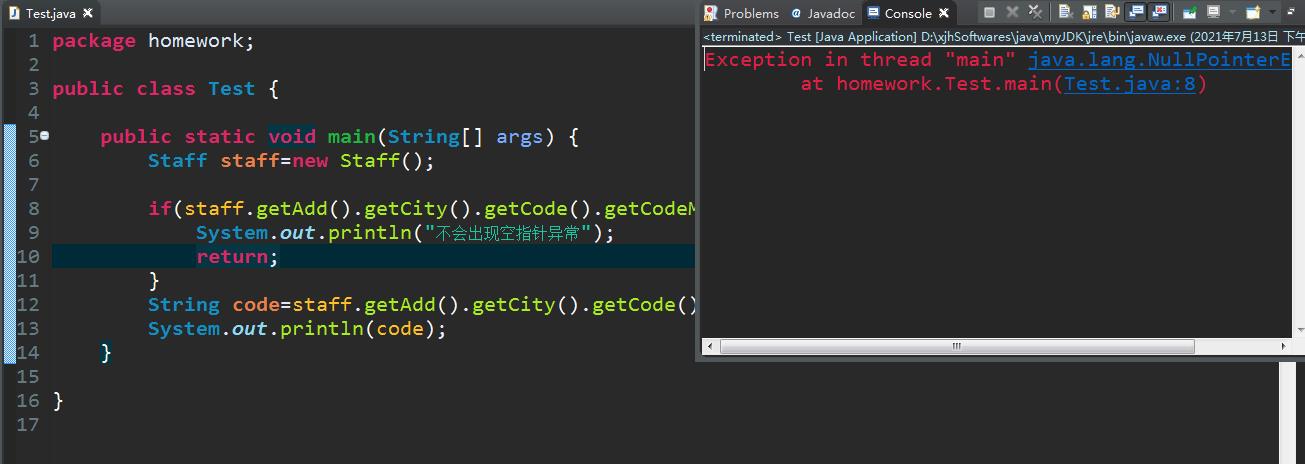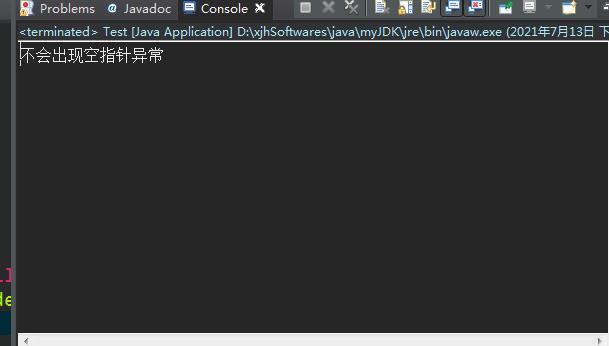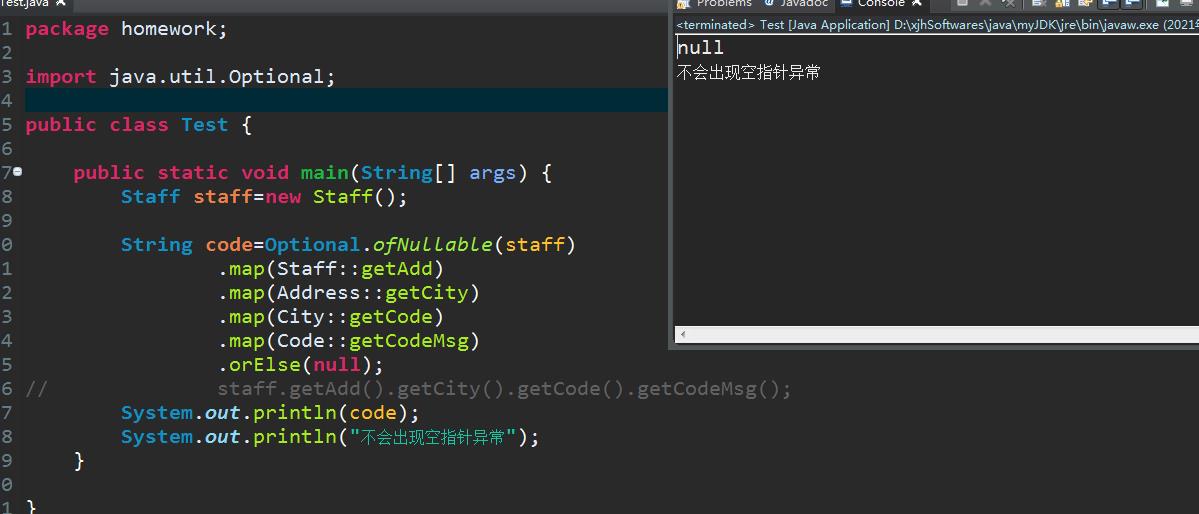除了try{}catch{},你究竟还知道多少避免空指针异常的骚操作?
Posted 四原色
tags:
篇首语:本文由小常识网(cha138.com)小编为大家整理,主要介绍了除了try{}catch{},你究竟还知道多少避免空指针异常的骚操作?相关的知识,希望对你有一定的参考价值。
你究竟还知道多少避免空指针异常的那些骚操作?
一个有趣的bug总能找到一个有趣的java8特性!当我们遇到空指针异常时,你还在使用try...catch吗?那就太out啦!这里教你一招使用java8特性来避免空指针异常。
小伙伴知直呼——装到啦!
目录
我们从一个staff案例开始,这里的类结构我们为了演示暂时随便写(不要介意),在构建的Test类中实例化这个Staff,并依次调用方法,获取员工的地址编码!
public class Test
public static void main(String[] args)
Staff staff=new Staff();
String code=staff.getAdd().getCity().getCode().getCodeMsg();
System.out.println(code);
但是run后发现他报错了,太正常了!

class Staff
int uid;
String uname;
Address add;
public Staff(int uid, String uname, Address add)
super();
this.uid = uid;
this.uname = uname;
this.add = add;
public Staff()
super();
// TODO Auto-generated constructor stub
/**
* @return the uid
*/
public int getUid()
return uid;
/**
* @param uid the uid to set
*/
public void setUid(int uid)
this.uid = uid;
/**
* @return the uname
*/
public String getUname()
return uname;
/**
* @param uname the uname to set
*/
public void setUname(String uname)
this.uname = uname;
/**
* @return the add
*/
public Address getAdd()
return add;
/**
* @param add the add to set
*/
public void setAdd(Address add)
this.add = add;
class Address
int id;
City city;
public Address()
super();
// TODO Auto-generated constructor stub
public Address(int id, City city)
super();
this.id = id;
this.city = city;
/**
* @return the id
*/
public int getId()
return id;
/**
* @param id the id to set
*/
public void setId(int id)
this.id = id;
/**
* @return the city
*/
public City getCity()
return city;
/**
* @param city the city to set
*/
public void setCity(City city)
this.city = city;
class City
Code code;
String name;
public City()
super();
public City(Code code, String name)
super();
this.code = code;
this.name = name;
public Code getCode()
return code;
public void setCode(Code code)
this.code = code;
public String getName()
return name;
public void setName(String name)
this.name = name;
class Code
int id;
String codeMsg;
public Code()
public Code(int id, String code)
super();
this.id = id;
this.codeMsg = code;
/**
* @return the id
*/
public int getId()
return id;
/**
* @param id the id to set
*/
public void setId(int id)
this.id = id;
/**
* @return the code
*/
public String getCodeMsg()
return codeMsg;
/**
* @param code the code to set
*/
public void setCodeMsg(String code)
this.codeMsg = code;
1. 错误分析
main方法在staff调用过程链中的每个环节中都存在空对象!
2. 第一步解决方案
2.1 解决过程
main方法中,在调用方法前对调用链中的环节进行判断。
public static void main(String[] args)
Staff staff=new Staff();
if(staff.getAdd().getCity().getCode().getCodeMsg() == null)
return;
String code=staff.getAdd().getCity().getCode().getCodeMsg();
System.out.println(code);
运行结果仍然出错了:

2.1 过程分析
显而易见,这样是错误的,调用链中,如:
- staff可能为空
- staff.getAdd()可能为空
- staff.getAdd().getCity().getCode()也可能为空
所以这样的判断条件是不充分的,仍然存在空指针异常。
3. 第二步解决方案
2.1 解决过程
根据第一步解决办法我们进行完善判断条件得到第二步解决办法:
public static void main(String[] args)
Staff staff=new Staff();
if(staff==null ||
staff.getAdd() == null ||
staff.getAdd().getCity() == null ||
staff.getAdd().getCity().getCode() == null ||
staff.getAdd().getCity().getCode().getCodeMsg() == null)
System.out.println("不会出现空指针异常");
return;
String code=staff.getAdd().getCity().getCode().getCodeMsg();
System.out.println(code);
运行结果:

2.1 过程分析
明显,运行后并没有出现新的空指针异常了,但是这个判断过程实在是比较繁琐,好多同学反映这样不太友好,他说:“如果这个调用链好长怎么办?写这么多判断条件不友好啊!”
4. 使用java8特性后
根据同学们的反馈,我们直接来使用java8为我们提供的避免空指针异常的新特性:
public static void main(String[] args)
Staff staff=new Staff();
String code=Optional.ofNullable(staff)
.map(Staff::getAdd)
.map(Address::getCity)
.map(City::getCode)
.map(Code::getCodeMsg)
.orElse(null);
// staff.getAdd().getCity().getCode().getCodeMsg();
System.out.println(code);
运行结果,发现是不会出现空指针异常的:

5. 总结
其实,在日常工作学习中不断地探索和发现一些Java8特性是一个非常有意义的过程!
但是我们不可不知的是,无论在什么情况下,一个空指针异常或许是一件不能去避免的过程,如果强行掩盖一个这样的问题,那么迎接的问题可能会更加严重,一句老话说得好,叫“丢了西瓜,捡了芝麻”,敲代码就是不断发现错误和解决错误的一个过程,有时候使用某些方法就行这里一样去避免这种空指针异常一样,我们需要一个工具来避免异常的发生。

以上是关于除了try{}catch{},你究竟还知道多少避免空指针异常的骚操作?的主要内容,如果未能解决你的问题,请参考以下文章